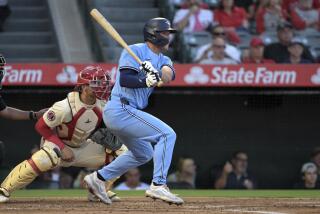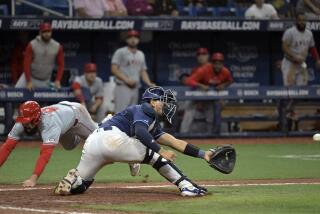Ray Streak Lives; Witt’s Does, Too
- Share via
TORONTO — Two remarkable Angel streaks continued Sunday as Johnny Ray hit safely in his 15th consecutive game and Mike Witt was shelled in his third consecutive start. His 1988 earned-run average rose to 6.11, nosebleed country.
Don’t ask the Angels to explain either streak. With the first, they don’t even try. And with the second, they don’t have a clue.
The Angels are paying Witt $1.4 million this year to supposedly head their pitching staff and win his annual 15 games or so. Money well spent, they figured, because since 1984, Mike Witt has been money in the bank.
But now look at Witt’s ledger after his first six starts of this season, including Sunday’s 6-4 loss to the Toronto Blue Jays: 1-3, 56 baserunners in 35 innings, and--most alarmingly--a 10.80 ERA in his last three starts.
Witt, the Angel stopper, has barely gotten started in each of his past three outings. He lasted 5-plus innings in a 9-8 loss to Oakland, he was knocked out after 5 innings in a 6-0 defeat to Detroit and, this time, he staggered through only 3 innings.
By the time Angel Manager Cookie Rojas mercifully pulled the plug on Witt’s start, Toronto had already amassed 8 hits and was leading, 6-0.
The Angels then spent the rest of the afternoon trying to play catch-up, chipping away with a Mark McLemore sacrifice fly here, a Wally Joyner home run there. And in the ninth inning, they extended Toronto’s All-Star relief pitcher, Tom Henke, long enough to get one final at-bat for Ray, who used it to produce a streak-saving RBI single.
But the early damage was too much for the Angels to overcome and, afterward, all they could do was shake their heads over it.
“Mike’s been struggling and we’ve got to get him going--somehow,” Rojas said. “I wish I knew the answer.”
Say the same for Angel pitching coach Marcel Lachemann.
“Obviously, something is out of whack,” Lachemann said. “The bottom line is, he’s not getting the ball where he wants to. What’s causing it, that’s for me to find out.”
Lachemann insists he and Witt have already been working overtime to troubleshoot the problem.
“We’ve been working on several things,” Lachemann said. “But it’s obvious I didn’t do a very good job, did I? He’s working hard and if he keeps doing so, he’ll get it right. None of our pitchers works harder than Mike.”
Maybe too hard, someone suggested.
“I don’t think anybody can work too hard,” Lachemann snapped. “There’s no such thing as working too hard. When you stop working hard, you quit--and he will not quit. He will make it work.”
Witt, meanwhile, advanced a different, yet related, theory:
Maybe he’s thinking too hard.
“You like to keep things simple and I think I’ve complicated things by trying to do too much too early,” Witt said. “I’m thinking about too many things out there and it’s just gotten out of hand.
“Obviously, I’m always looking for ways to improve, but I’ve maybe started to dissect things too much.”
Witt admits to being a video junkie, poring over old tapes of himself in the Angel clubhouse between starts, endlessly searching for the perfect delivery. And lately, his eyes have been glued to his third start of this season--which, not coincidentally, was his only victory, a 5-3 complete-game triumph over Seattle.
With his next start, Witt plunged into the slump that followed him into Canada.
“I think I broke down that third start on video so much, and studied it for so long, that I hurt other things,” Witt said.
“It’s one thing to have two good starts, one bad one, two good ones and then two bads. But I’ve had three good starts--and then three bad ones. What the hell is going on?
“I did a lot of (video study) this winter and when I went into spring training, I had things down to where I had it good (Witt was 5-0 in the spring). And I started off the season fairly decently. But then I started dissecting everything I was doing right, instead of just sticking with it.”
Ken Brett, the former big league pitcher and current Angel radio broadcaster, agreed with Witt’s analysis of too much self-analysis.
“That’s not a bad idea,” Brett said. “See the ball, throw the ball.”
Of course, the Blue Jays also helped complicate matters Sunday. Toronto scored five runs in the second and third innings, with major blows delivered by Jesse Barfield (run-scoring triple), Lloyd Moseby (two-run home run), George Bell (double) and Fred McGriff and Rick Leach (RBI singles).
Then, in the fourth, Witt surrendered a leadoff single to Leach, which Angel right fielder Chili Davis complicated into two bases by kicking the ball. Following an out and a balk, Witt gave up another single to Manny Lee, the Blue Jays led, 6-0, and Witt was headed for the clubhouse.
For the Angels, the only remaining suspense was whether Ray could extend his hitting streak to a 15th game. Ray began the day 0 for 3 and when Bell made a running, backhanded catch of Ray’s line drive in the eighth inning, the streak appeared to have ended.
But the Angels staged a mini-rally in the top of the ninth, with Joyner and Davis getting back-to-back singles with two outs. That bought Ray one extra at-bat and, with it, he grounded a Henke pitch through the right side of the infield for an RBI and the streak-saver.
Thanks to some luck, Ray will go for 16 straight tonight in Cleveland. And Witt?
Yes, back to the video room.
“I can’t do nothing,” Witt said. “I still believe the best way to correct something is by watching video.”
Everything in moderation, though. Maybe this time, Lachemann or Brett can keep a stopwatch on him.
Angel Notes
Wally Joyner admitted Johnny Ray’s jeopardized batting streak was on his mind when the Angels prepared for their final at-bats in the ninth inning. “After George Bell took that base hit away from him, I thought, ‘Let’s try to get him one more time,’ ” Joyner said. “I’m happy he got the chance. Today was the day he wasn’t meant to get a hit--but he did. So maybe he’ll run off 15 more in a row now.” . . . Ray, typically, downplayed the drama surrounding his last two at-bats. On Bell’s sprinting catch down the left-field line: “I thought he was going to catch that ball easier than he did. Where he was standing, I kind of figured he’d catch it as soon as I hit it.” On his two-out single in the ninth: “I was just glad to get on base, score a run and get Jack Howell to the plate. He can pop one and if he does, we get a win. That was the main thing. You can’t worry about any streaks.”
Lloyd Moseby was involved in a minor controversy, played over the course of five innings. In the third inning, Moseby homered off Mike Witt and then stood in the batter’s box, savoring the home run--and, in the minds of the Angels, showing up Witt. Then in the seventh inning, Moseby batted again and Angel reliever DeWayne Buice buzzed a 1-0 fastball inside--a pitch that drew a warning from home plate umpire Dan Morrison. “Dan said he threw too close to Moseby,” said Manager Cookie Rojas, who disputed Morrison’s warning. “What, we can’t pitch inside? That’s ridiculous. We’re not going to hit a guy in that situation. I think (Morrison) overreacted. If I want to hit somebody, I’m going to nail him.” Added Buice: “Moseby did show up Witt; he stood there and watched the ball. But it’s my job to get him out. I’m certainly not going to hit him, not when he is five times bigger than me. He’d tie me in a pretzel knot.” . . . Relief pitcher Ray Krawczyk replaced Witt in the fourth inning and worked 2 scoreless innings, but had to leave the game after pulling his left hamstring while covering first base on an infield out. “When I started over to first, I had this sharp pain all the way down my leg,” Krawczyk said. “They say it’s a strain. I’ll take a couple days off and that should take care of it.”
More to Read
Go beyond the scoreboard
Get the latest on L.A.'s teams in the daily Sports Report newsletter.
You may occasionally receive promotional content from the Los Angeles Times.






